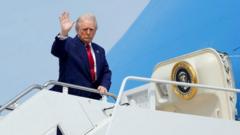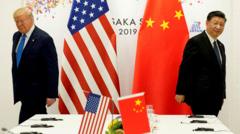In light of rising tariffs implemented by the U.S. under President Trump, European companies face unprecedented challenges, prompting a closer look at potential partnerships with China. Historically fraught with tension, the E.U.-China relationship might be tested anew, presenting prospects for both collaboration and conflict.
**Growing Trade Tensions: Will Tariffs Bind Europe and China Closer Together?**

**Growing Trade Tensions: Will Tariffs Bind Europe and China Closer Together?**
As the European Union reconsiders its trade strategy amid escalating tariffs, potential shifts in alliances could reshape global economic landscapes.
The global trade landscape is being redrawn as the implications of U.S. tariffs ripple through the economies of Europe and China. With a looming 20% tariff on European exports and over 50% on key Chinese goods, companies in both regions are exploring new avenues for commerce. The European Union possesses the second-largest consumer market globally, a crucial consideration as companies search for alternatives to their dwindling access to American markets.
Yet, the relationship between the E.U. and China remains complex. Concerns regarding Chinese market practices, especially in terms of dumping cheap products, continue to complicate matters. Notably, last year's imposition of increased tariffs on Chinese-made electric vehicles has contributed to rising tensions. However, China’s recent announcement of renewed negotiations could hint at a potential thaw.
Analysts such as Theresa Fallon caution that any rapprochement could be double-edged. On one hand, a convergence might serve to balance against American tariffs; on the other, increased Chinese imports into Europe could exacerbate existing grievances, raising the specter of further economic fragmentation.
As both regions navigate this treacherous terrain, the future of their cooperation and competition remains uncertain. E.U. officials are conscious of the delicate balancing act ahead, as they aim to navigate the complexities of shifting global trade dynamics.
Yet, the relationship between the E.U. and China remains complex. Concerns regarding Chinese market practices, especially in terms of dumping cheap products, continue to complicate matters. Notably, last year's imposition of increased tariffs on Chinese-made electric vehicles has contributed to rising tensions. However, China’s recent announcement of renewed negotiations could hint at a potential thaw.
Analysts such as Theresa Fallon caution that any rapprochement could be double-edged. On one hand, a convergence might serve to balance against American tariffs; on the other, increased Chinese imports into Europe could exacerbate existing grievances, raising the specter of further economic fragmentation.
As both regions navigate this treacherous terrain, the future of their cooperation and competition remains uncertain. E.U. officials are conscious of the delicate balancing act ahead, as they aim to navigate the complexities of shifting global trade dynamics.






















